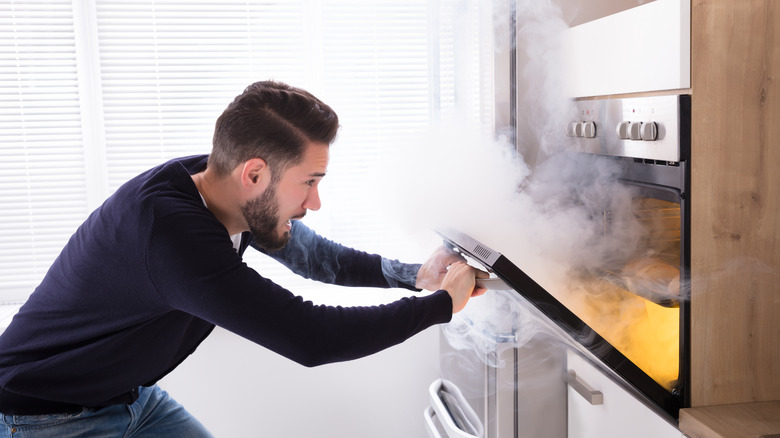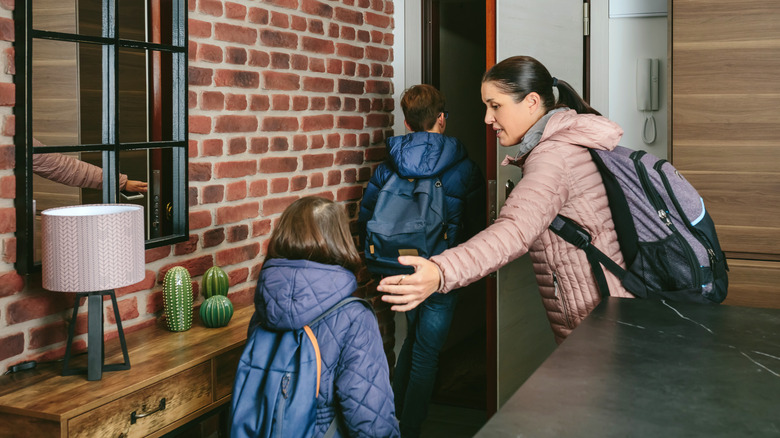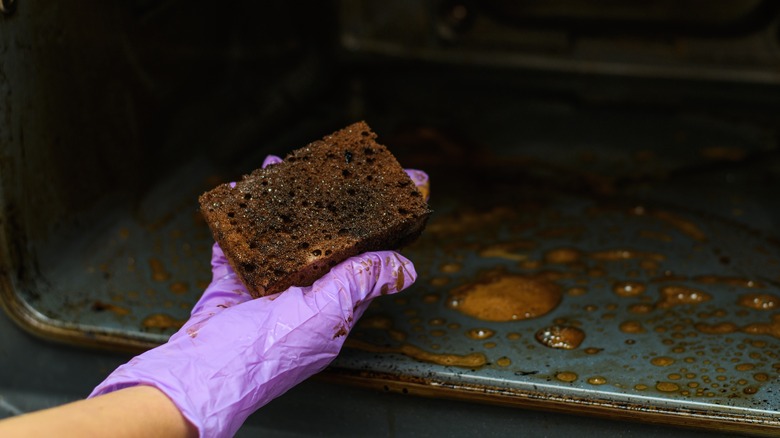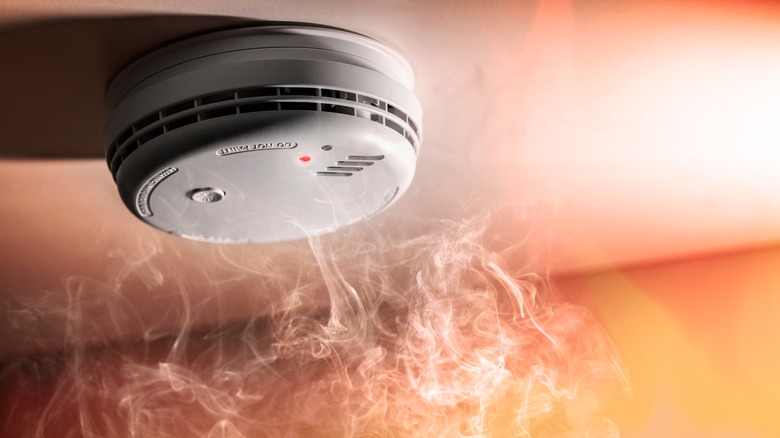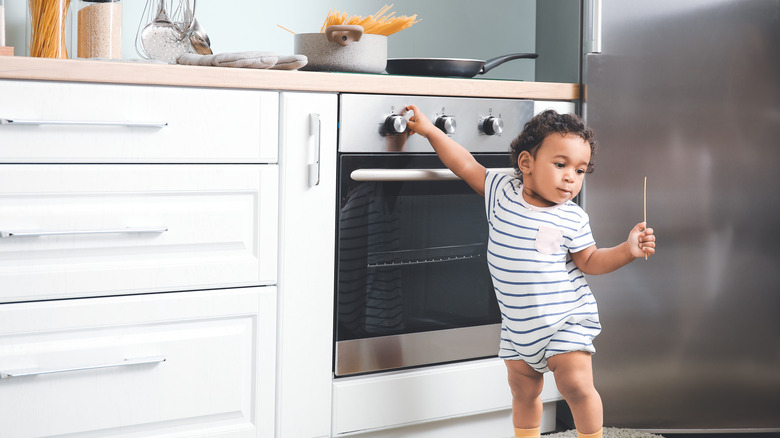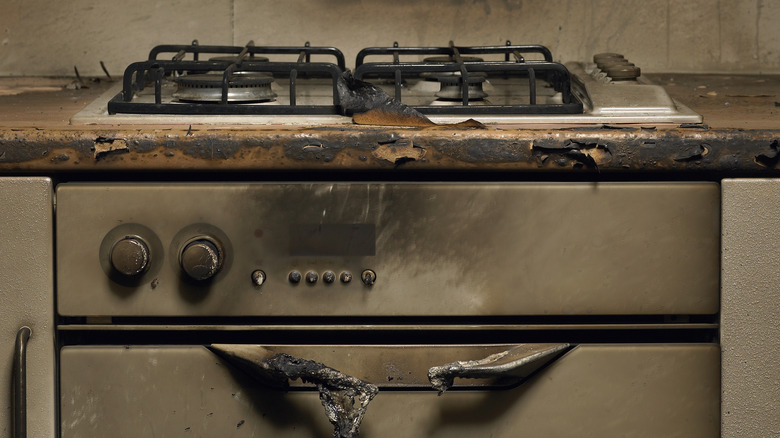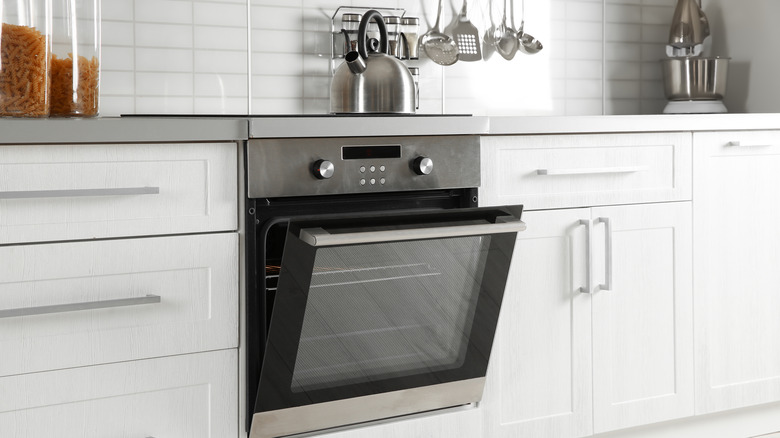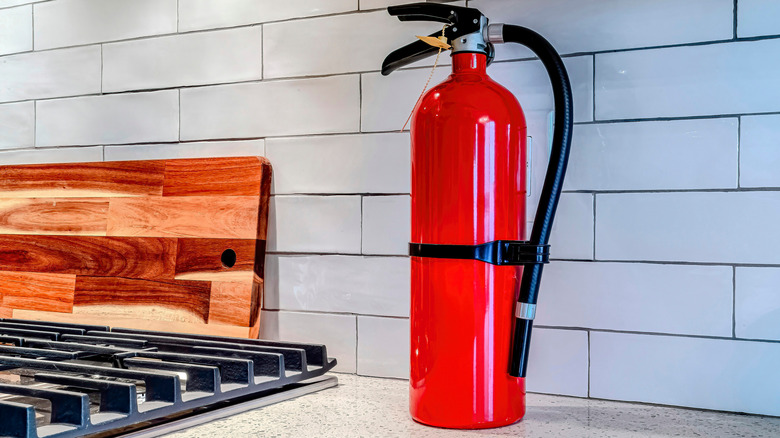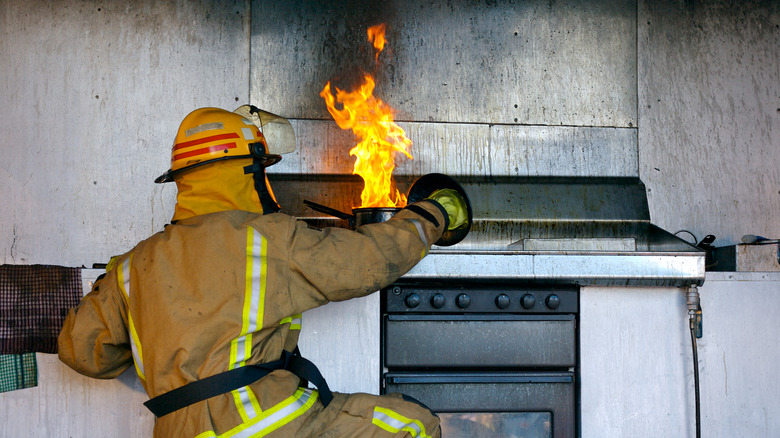Important Precautions You Should Know To Prevent Oven Fires In Your Home
According to the National Fire Protection Agency, cooking was the number one cause of home fires between 2014 and 2018. Similarly, it was also the top cause of fire injuries in homes and caused the second most number of fire-related deaths in a home. While Thanksgiving and Christmas were the two days with the most home cooking-related fires, oven fires were not limited to just these days. In 2018, there were an average of 470 cooking fires each day.
Beyond the immediate concern of injury or death, home fires, such as those caused by the oven, present a number of additional safety concerns. According to Avner Gat Inc., homes that had a fire often have diminished air quality, even after the fire has been taken care of. The smoke from the fire can get into the HVAC system, upholstery, and more. This can pose a threat to all individuals, particularly children, pregnant women, and those with medical conditions. Moreover, the fire itself combined with the high-pressure hoses used by firefighters to put it out can lead to structural damage and hazardous conditions. Taking steps to prevent oven fires in your home can help protect you against these serious health and safety concerns.
Don't leave the home when food is cooking in the oven
The number one cause of cooking-related fires, according to the National Fire Protection Agency, is unattended cooking. For this reason, you should never leave your home when the oven is on. As BigTimeKitchen explains, no one plans for an oven fire. Many people view the low overall risk of fire as an indication that it's OK to leave the house when the oven is on, especially if it's just to run a quick errand. However, while the chances of an oven fire are low, they are still there.
Leaving your home unattended means that if there was a fire, you wouldn't be there to catch it quickly, grab a fire extinguisher, and call 911. This could result in much more serious damage and destruction than what may have occurred if you had been home to act more quickly. You never know, you may have been able to completely prevent the fire by responding immediately to a smoke detector calling your attention to smoldering grease.
Keep your oven clean
A dirty oven can also increase the chances of an oven fire. Barton Facilities Management shares that as more grease builds up in an oven, it becomes more likely that a fire may break out. This is because of how flammable oil, fat, and grease are.
Beyond reducing the chances of a fire, keeping your oven clean can deliver additional benefits. The buildup of grease and debris in an oven can negatively impact the flavor of the foods you cook as the fumes from these greasy messes penetrate the new dish you have cooking inside the oven. Too much buildup inside an oven can also potentially damage the oven or cause it more strain as the heating elements work to warm up.
As Arm & Hammer shares, oven cleans can contain toxic chemicals that can threaten the respiratory system. If these chemicals come into contact with the skin or eyes, they can also burn. Choosing a more natural oven cleaning alternative, such as baking soda, will allow you to keep your oven clean and free of grease without threatening the health of anyone in your home. Baking soda works as a mild abrasive, which means it can effectively remove stuck-on foods from the bottom of the oven.
Install a smoke detector close to, but not in, the kitchen
Smoke detectors can alert you to potential fires before they happen and can help give you and others in your home time to exit the premises before it is unsafe to do so. The National Fire Protection Agency shares that you should put a smoke detector on every floor of the home, inside each bedroom in the home, and outside any sleeping areas. When it comes to placing a smoke detector in a kitchen, you want to make sure that it is at least 10 feet away from ovens and other cooking appliances. This placement will allow the smoke detector to work and catch early signs of smoke, but will also help prevent false alarms caused by normal cooking practices.
Smoke alarms should be placed on the ceiling or the upper portion of the wall (a maximum of 12 inches away from the ceiling) to detect rising smoke. When choosing smoke detectors for your kitchen and the rest of your home, be sure to choose models from trusted manufacturers. You should only purchase smoke alarms that have been tested by a repeatable laboratory.
In addition to installing smoke detectors close, but not too close, to your oven, you should also make sure that you have a carbon monoxide alarm (or a combination smoke and carbon monoxide detector). A carbon monoxide detector can help you catch a gas leak from a gas oven, protecting your home and all of its inhabitants. As Consumer Reports shares, even if you do not have any fuel-burning appliances and live in an all-electric home, you'll still want carbon monoxide detectors in your home. They'll detect any carbon monoxide that sneaks into the home from the garage or any other source.
Take care when cooking at the stove if children or pets are around
Tufts shares that keeping children and pets away from cooking appliances can limit the chances of fires and other safety hazards. They suggest making the three feet of space in either direction around the stove a kid-free zone. When children or pets get too close to the stove, they could inadvertently get in the way. This could cause whoever is cooking to accidentally spill the contents of a hot pot in the oven, on the burner, or on themselves, the child, or a pet. The hot contents could potentially cause a fire or, at a minimum, burn the person or animal they spill on.
When cooking with children, it is also advisable to keep the handles for pots and pans turned away from the edge of the stove. This will decrease the chances of a child pulling a hot pot off the stove or accidentally spilling its contents over the burners, creating another fire hazard. MomLovesBest shares additional tips for cooking with children. They recommend getting an oven lock and covering or removing stove knobs, particularly if they're along the front of the appliance where children can more easily reach them. You can also purchase stove guards that can stop individuals under a certain height from reaching the burners or control knobs for the stove.
ADS Security notes other precautions you can take when cooking around pets. Removing or covering the stove knobs can stop a pet from accidentally bumping into the knob and turning on the stove, potentially starting a fire. Pets should be watched closely when they're around the stove or oven. Keeping pets out of the kitchen when meals are being cooked is often the best option.
Don't leave your home unattended when using the self-cleaning setting
Just as you shouldn't leave your home when food is cooking in the oven, you also shouldn't leave when using a self-cleaning cycle. While the self-cleaning cycle can be a helpful feature when trying to remove grease and other debris from the oven interior, Alpha Tech explains that it can also be a fire hazard. A self-cleaning cycle on an oven uses extremely high temperatures — over 800 degrees Fahrenheit — to clean the oven. These higher temperatures cause the stuck-on food and grease to burn off the oven base and walls, allowing users to wipe it out after the cycle is complete. However, the higher temperatures can also lead to sparks caused by too much grease or food in the oven.
Staying home any time you use the self-cleaning cycle on your oven can help prevent a fire from getting out of control. You'll be able to act quickly to call for help or extinguish the fire. Another step you can take to reduce the risk of an oven fire breaking out during a self-cleaning cycle is to remove as much food residue from the oven before starting the cycle.
Do not try to use an oven to heat a home
On a particularly cold day, it may be tempting to turn on your oven, open the door a bit, and use it to heat the home. This may be especially true if your power is out and you have an older gas oven that can run without electricity. However, according to All Air Systems Heating and Cooling, LLC, trying to heat your home with an oven is never a good idea.
Using a gas oven to warm a home increases the risk of carbon monoxide poisoning. Carbon monoxide exposure can cause dizziness, fainting, and headaches, even with lower levels of exposure. If too much carbon monoxide is released, it can cause death. Gas ovens release even higher levels of carbon monoxide into the air when the door is open.
Even electric ovens should not be used for heating a home. While they do not release carbon monoxide like gas ovens do, they are not designed to be used for heating purposes. Ignoring the manufacturer's directions for use of an electric oven could cause it to overheat. With the best-case scenario, this may lead to required repairs or a decreased lifespan. The worst-case scenario would be an oven fire.
Keep an A:B:C chemical fire extinguisher close by
Having a fire extinguisher easily accessible could mean the difference between a few flames in the oven and a full-on fire that burns down the entire home. The Home Depot explains that there are different types of fire extinguishers that are designed for use with different types of fires. A Class C fire extinguisher can be used on fires in appliances, electronics, and other electrical equipment.
Keeping an A:B:C fire extinguisher in your kitchen will help you put out fires in your oven and other areas of the kitchen. A:B:C fire extinguishers are not only safe to use with oven fires, but they can also be used on wood, rubber, plastic, oil, grease, and more. As a multipurpose fire extinguisher, an A:B:C model will make sure you're prepared for any fires that start in the kitchen.
Know what to do in the event of an oven fire
Taking steps to prevent oven fires is important. However, even the best preventative measures can sometimes fail. This is why you'll want to make sure you're prepared and know what you should do if a fire starts in your oven. According to Service Master Restore, you should not open the oven door to try to extinguish the flames. Doing so will provide more oxygen to the fire, which can cause it to grow and spread.
If you do see a fire, immediately turn off the oven and all of the top burners. Clear the counters around the oven and unplug other appliances. Reach for your A:B:C fire extinguisher and have it ready to spray any flames that come out of the oven door. Never use water to try to put out an oven fire, as it can cause the flames to grow and spread more quickly. Water should never be used to put out fires on any electric devices.
Keep an eye on the flames and call 911 if they are not immediately dying down. If you ever have any questions about your safety or that of anyone else in your home, go outside and stand a safe distance away. Be sure to wait for clearance from the fire department before returning.
